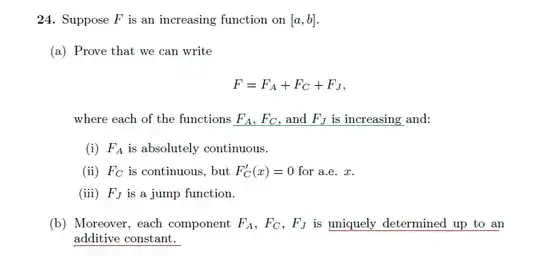I'm solving exercise 24 of chapter 3 in Stein's Real Analysis, and I've found a good material regarding the exercise in here. Below is the given exercise.

In this link, I've got 2 additional questions.
First, the green line in the exercise says the decomposed functions $F_A, F_C, F_J$ are increasing, which doesn't seem to be proven in the above link. I guess the fact that the jump function is increasing sounds weird (∵ the points where jump occurs are not continous, if the points are continous then the function is not jump function any more), so the author of the link didn't show that $F_J$ is increasing. Do you think is it correct?
Second, I want to clarify the meaning of "uniquely determined up to an additive constant". Based on the above link, the meaning is estimated that (in the case of $F_A$ for example, if $F_{A1}$ exist and $F_{A2}$ is another function that is absolutely continous, then $F_{A1} - F_{A2}$ is constant.
Any explanation about this would be appreciated. Thank you.